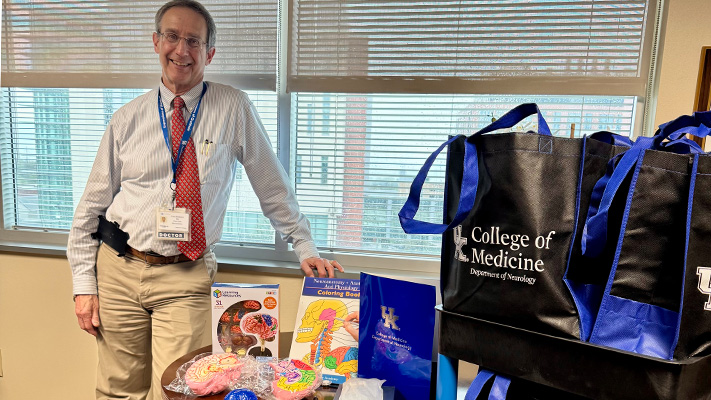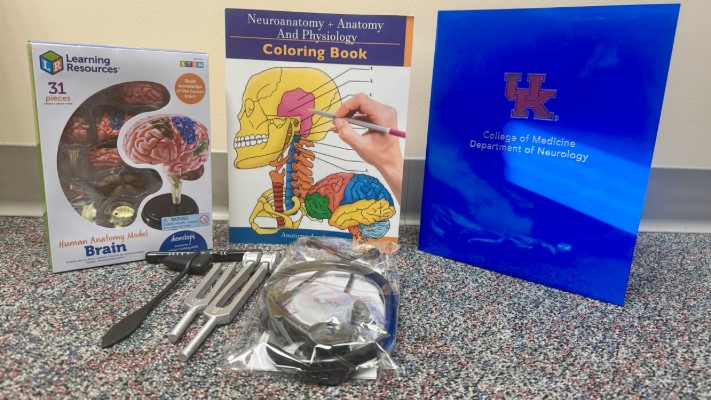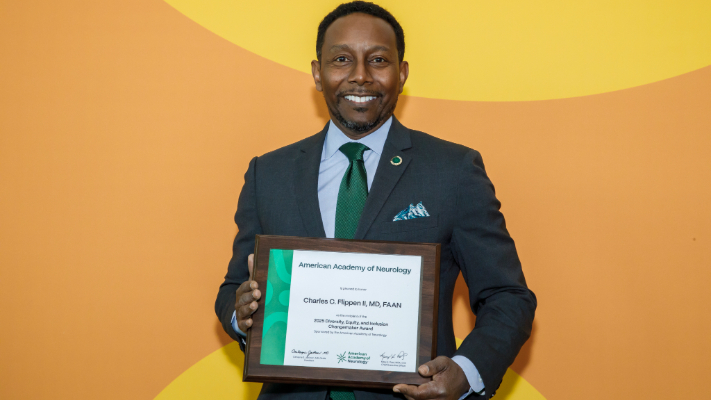Need support for a great project? Apply for AAN DEI Grants
August 11, 2025
In Lexington, Kentucky, a large group of students at Bryan Station High School are starting their journey into the health care world early.
“The program is dedicated to empowering these students through support, mentorship, and enrichment opportunities,” said Ima Ebong, MD, MS, FAAN, at the University of Kentucky. “The goal is to assist these students in their transition from high school to college and, ultimately, into the health care profession, where they would be part of a diverse and equitable workforce that reflects the communities we serve.”
The University of Kentucky Department of Neurology is part of the university’s Discovery Healthcare Program, which empowers high school students interested in medicine through support, mentorship, and enrichment opportunities. Freshmen participate in Ignite Sessions and “in-house” field trips, where representatives of different health care fields provide hands-on learning. Sophomores participate in a longitudinal case study and two campus visits, which can include shadowing, laboratory tours, and hands-on simulation activities; juniors take part in quarterly campus visits; and seniors shadow health care professionals in the clinic.
Ebong and her department wanted to prepare students for their clinical shadowing experience, so they sought a grant through the AAN. Their application was successful, and the 22 high school juniors participating in the program each received a set of neurology education materials and diagnostic tools.
“The students were elated and grateful for their gifts,” Ebong said. “By introducing students to the field of neurology during the pre-college years, we hope to foster the growth of future neurologists who will diversify our field. Early exposure to and access to neurological tools will allow us to expand our interactive educational experiences to demonstrate the scope of neurology. Our educational opportunities will benefit the students, their future patients, and our communities.”
AAN DEI Project Grants
Ebong is a 2025 recipient of the AAN DEI Project Grants, a set of two $2,000 grants that support projects, events, and activities fostering diversity, equity, and inclusion within academic neurology departments or the communities they serve. At the end of the grant period, recipients present their projects and share their experiences at a virtual meeting of the AAN Diversity Officers Subcommittee.
The other 2025 recipient is Jonathan Williams, MD, at Washington University. His aim was to engage the Black community in St. Louis to understand their perceptions of epilepsy and barriers to care.
“It’s always surprised me how many people’s lives are touched by epilepsy—they might know a family member or friend who has it, or they have it themselves,” Williams said. “It’s a topic that a lot of people can relate to, but then the specifics of ‘What does that mean?’ ‘What are you supposed to do?’ That’s where sometimes I lose people, and it becomes apparent that there’s a need here. There’s a stigma and a lack of guidance on when to get help.”
Williams’ institution had already created an epilepsy-specific resident clinic, but there were still gaps and barriers to care. He wanted a better way to understand those gaps and look outside the clinic.
“From a doctor’s side of things, you can build it, you can be there, but if a person can’t get to the clinic or it’s not at a time that’s suitable for them, or whatever the factor may be, then it may not reach them,” he said. “The goal was to increase our reach.”
Williams connected with community partners in St. Louis, creating focus groups and a survey to “teach and reach”—assessing participants’ situations and providing key education about epilepsy, such as when to see a doctor. He also partnered with interested residents to review charts and better characterize patients’ outcomes and demographics, figuring out what questions need to be asked and where potential solutions could lie.
“We’re still utilizing our survey and these smaller key informant interviews and groups,” Williams said. “My hope is that we can upscale that, too, when we have a bigger cadre of people, so that we can utilize these tools that we're making to get a more robust answer and turn that into something that helps other people tackle these same issues.”
AAN DEI Innovator Grants
While the AAN’s DEI Project Grants are intended for recipients who already have experience in DEI approaches, a second grant program is available for those who don’t. The DEI Innovator Grants are two $2,000 funds for those who are new to the space but have an innovative project, event, or activity idea, also within academic neurology departments or the communities they serve. Recipients have the opportunity to get feedback on their ideas and collaborate with diversity officers and other institutions.
One 2025 recipient is Jennifer Juhl Majersik, MD, MS, FAHA, FAAN, at the University of Utah. Her state is home to nearly 60,000 Native Hawaiians and other Pacific Islanders, making it one of the largest proportional Pacific Islander populations in the continental US.
Majersik said Native Hawaiians and other Pacific Islanders face heightened risks of stroke. Compared to non-Hispanic White adults, they are almost four times more likely to have a stroke and 30% more likely to die from one. A higher prevalence of risk factors likely contributes, but the underlying causes have not been systematically explored. She added that for various reasons, some Pacific Islanders may have concerns about seeking health care.
“We know that tailored, community-specific education can improve risk factor control (such as hypertension), increase stroke symptom awareness, and develop self-efficacy in seeking immediate care if a stroke occurs,” she said. “Since I manage Pacific Islanders with stroke in the University of Utah hospital and in clinic, I started to look for existing stroke education specific to those communities. But I couldn’t find any.”
Majersik resolved to create stroke education tailored to the Pacific Islander community in Utah and beyond. She prepared to apply for the grant by conducting a survey of Utah Pacific Islanders’ stroke knowledge with the help of the University of Utah Stroke Center team, attending various festivals, and using email lists provided by members of the university’s Pacific Islander Utah Stroke Council. She learned that some Pacific Islanders would like to receive education through members of their community.
After receiving the AAN grant and matching University of Utah funds, she started work with the university’s science education group to design a video. However, before the project was in full swing, she was asked to be a mentor in the university's , a summer internship research program for undergraduate students from the Pacific Islands.
“This turn of events was instrumental in getting this project fully launched,” Majersik said. “The student took over the stroke education video development. She developed a script that included students in her program introducing themselves in their native languages and then interviewing myself and my fellow about stroke signs and symptoms. We are currently finalizing this video, but early feedback has been very positive in how it includes students from multiple islands and shows how a young generation cares about the health and well-being of their elders.”
The intern and her classmates also introduced Majersik to the owner of a local kava lounge. She and her team participated in a Facebook livestream through the lounge, providing stroke education in a live broadcast across the Pacific Islands.
“This wasn’t the kind of effort I had ever previously participated in (drinking kava on a livestream!) so was a ‘stretch’ for me—and an absolute highlight of my summer,” Majersik said. “The student and I are still working on our education program and a knowledge survey, and we have agreed to continue the work even after her internship ends, as she is now part of our Utah stroke community.”
Also receiving the 2025 AAN DEI Innovator Grant was Rachel Forman, MD, at the Yale School of Medicine. Her aim was to tailor an existing community stroke education program to address specific community needs and values in New Haven, Connecticut.
“I have been doing stroke outreach initiatives with a program called Stamp Out Stroke at Yale,” Forman said. “What we do is we try to focus on under-resourced communities and teach people about stroke risk factors, warning signs, and the importance of calling 911. We’ve probably educated well over 2,500 people in the last four years or so.”
Forman noticed, however, that the program tended to bring the same presentation to all of the communities they served. She began to wonder whether the information was accessible, culturally relevant, and effective for the entire local community, and decided to pause to better tailor the program.
“We have done a number of focus groups in partnership with the Community Action Agency of New Haven, a community-based organization that serves a lot of diverse needs. After recording and analyzing the focus groups, we found some interesting themes. There was a lot of focus on diet, but people didn’t really know where to find convenient, healthy options. We also found a mistrust and worry about discrimination and the cost of calling 911 and going to the hospital.”
With takeaways from the focus groups in mind, Forman connected with Nate Wood, MD, the director of culinary medicine at Yale. Wood created a 10-minute video about eating healthier on a budget—and a busy schedule—to be shared with stroke survivors and the wider New Haven community. Her team also gave their findings to a company that creates interactive content at an accessible reading level. Soon, they gave their first presentation with the new materials.
“People thought it was improved and more geared towards them,” Forman said. “For instance, we even found some information about financial aid that people could get with the ambulance bill after calling 911. We were able to address their issues through the presentation, making it community-facing as opposed to academic.”
The presentations are conducted several times per month, and Forman is looking forward to reaching more people with it and seeing if the new approach can be adapted for other communities and regions.
Apply for DEI-related grants and awards
Both the DEI Project Grants and the DEI Innovator Grants are accepting applications through October 3, 2025. You can view eligibility requirements and apply online now, or share the program with a colleague.
Also now accepting applications is the Changemaker Award, which honors an AAN member who has made a meaningful contribution within their academic institution by increasing diversity, equity, and inclusion efforts within the neurology department. Recipients receive a $1,000 prize, complimentary registration for the AAN Annual Meeting, and give a 30-minute presentation at the meeting highlighting their work. The 2025 recipient of the Changemaker Award is Charles C. Flippen II, MD, FAAN, the vice president of the AAN.
“I am honored to be the most recent recipient of the AAN Changemaker Award,” Flippen said. “It is an important recognition of the work that I and many others are doing to provide equitable access to our profession and clinical care. As a career-long educator, I enjoyed the opportunity to share my views, and hopefully some inspiration, on shaping a neurologist workforce that reflects the populations we serve.”
Applications for the Changemaker Award are open through October 21, 2025.

University of Kentucky Department of Neurology Chair Larry B. Goldstein, MD, FAHA, FAAN, packing the items to be given to high school students.

Some of the items provided to the high school students preparing for careers in health care.

Charles C. Flippen II, MD, FAAN, after receiving the AAN Changemaker Award.